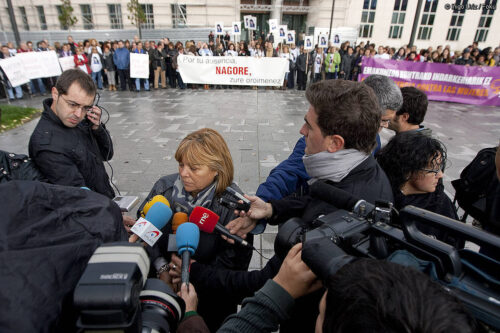"I've had justice, but it's for the support I've received."
- Since the murder of Nagore Laffage in 2008, Asun Casasola has been working in schools to eliminate male violence with the documentary 'Nagore'. It is fifteen years since his daughter was murdered by Diego Yllanes. Awareness of the issue has increased.

In the Sanfermines of Pamplona in 2008, Diego Yllanes killed Irunesa Nagore Laffage Casasola. This year marks the fifteenth anniversary of the murder. Since then, Laffage's mother, Asun Casasola (Villamuriel de Cerrato, Spain, 1957), has been working for a world without male violence.
On Monday you were in Pamplona in tribute to your daughter Nagore Laffage. What does it feel like when you leave?
These are days of gratitude to people. I am grateful that after fifteen years they are still moving. I can move, yeah, it's my daughter and I'll keep moving it. But it is very grateful that a group is present and that many people stay for fifteen years in Pamplona and other places. These days I am very nervous, I sleep badly, and I also feel very happy because the Plaza Vinculo is filled, they hug me, they teach me love… It is not a bad day.
On Monday he publicly thanked the support for the family.
My family is there, in Pamplona. My family is everywhere I am. For example, last Monday for the Irunans it was a bad day to go to Pamplona, due to the traffic changes of the Tour de France. Every year I organized a bus to go there, but on Monday we couldn't organize it and we had to drive. People had work and went crazy to get to Pamplona. However, everyone made an effort to assist. In Pamplona there were many people, including the Navarre authorities, and that is always to be welcomed. They must change the world and they are also responsible for not losing rights. I ask you to move, not to fall asleep.
It's been 15 years since Nagore Laffage's death. What fifteen years have passed?
These have been years of struggle and at the same time I have felt myself a privileged mother. There are many mothers who have passed my situation and I have received the love of the people. I think I'm a privileged mother in the tragedy. My crutches are Monday Lilas. They tell me: “Go there!” And I go there. It's true that I let them take me, but they're my crutches.
What else has he done?
Helena Taberna made the documentary Nagore, with which I have already gone to 104 places. Most have been schools. The last session was June 30, so St. Martial Day was not in Irun. I have to say that after passing that of Nagore, the Irun festivities are not my priority; he called me to go to Zaratamo [Bizkaia] the technique of Equality of the city council, and there I was. I move a lot to bring the documentary to schools, because I think it's important. I'm in constant struggle to see things, to change things. The school also serves me to think that Nagore's death as a mother has served something. Some people ask me why I don't stay and the answer is I think I'm doing a job. I'm not going to say, "I want to go there," but if you call me, I'm not going to say nothing. I know the teachers are able to project the documentary and deal with the subject, but they usually talk to each other and usually decide it's much better to go me. Kids ask me questions like this. I am very grateful to Helena Taberna for making a documentary, because with this work I feel that Nagore's death has served something.
The documentary premiered in 2010 and has since been in several schools to raise awareness of male violence. Have you noticed any changes in schools over these fifteen years?
Yes. At first, when I started going to class, the boys wouldn't ask me, the girls alone asked questions. Now I see that the years have passed and that these boys and girls feel identified with those who appear in the documentary, participate more. Young people denounce macho attitudes, get angry with them. For the victims everything goes very slowly, but I think we are moving forward, because we are working hard in schools and in families. At the same time, many associations are working on the issue of equality. I once went to the University of Barcelona and they were working on a project called Club de los Valientes for application in schools; the Dumboa School of Irún already has it. I remember when I was at Dunboa's school, an 8-year-old came to me: “I’m from the brave club, Asun!” I had no idea what it was, and they told me it's a job to remove the whistleblower; because you're at the courageous club, you have to say what you don't like. I think it's important for the school to work on these values. That as a child you're committed to telling people when you see something that's wrong, and don't be afraid of someone calling you a whistle or whistle-blower.
Have you met another mother victim of male violence?
I have many around me. Many die of grief or sadness like my husband. Everything has a cost. Apparently, I love myself a lot and whenever something happens I ask for help. If I have to take the pills, I will take them; and if I need other help, I will. The documentary shows how my husband talked about Nagore as if he was 8 years old, and the lightning was 20 years old! Since the day of the crime he could not look at his daughter as mature.
I also know the mother of the children Ruth and José Breton [disappeared in 2011, at 6 and 2 years; the judge decided that his father died calcined], and I think he is very brave. I also bear in mind the case of Laura del Hoyo and Marina Okarinska [former Okarinska couple killed in 2015]. I have a lot of people around me, a lot of people who are sunk, because they haven't had real protection. I'm in the group of wrestlers with them and I feel like I'm lucky. The other day, when I got a hug in Pamplona, I remembered it because I know they don't give that hug to other mothers. Maybe they don't have my strength either: I go everywhere, I do everything, and they might be given the opportunity, but they haven't wanted. I keep in touch with many mothers because I think we're all the same. When new cases occur and another mother is a victim, everyone has hope in Justice, but I have thought they have fallen into deceit. We help each other. At first, I also thought about Justice that they would solve the murder and that he would be in jail [Yllanes]. There are perspectives, but then…

You said that the greatest failure was justice.
Of course. Justice has been the biggest failure, and in my case the jury. If a jury jury jury is required, it should be mixed. If there is to be a jury jury jury, there are lawyers who say “if you said it, this will happen.” In my case there were six women and three men, all of them were young and they weren't stupid to ask. Three said it wasn't Nagore who called by phone. They killed the betrayal. He [Yllanes] said they were both on the floor and a sound technician said the phone call voice was a woman. So who was that voice from? If you don't want to understand it, if you don't want to see it, you'll say whatever you want. In these situations I am against the jury. I have always said that on this issue the murderer has social power. If it had happened to someone around me, it would have received a terrible sanction. Diana Quer [disappeared in August 2016 in Galicia and found the body in December 2017] and many more are murders, how do you know whether there has been betrayal or not, if you have found the body afterwards? Have they all been killed and Nagore's is the only one who has not been killed?
On the other hand, there is that of the reviewable permanent prison, with which I also disagree. In my case, the reports would indicate that everything was perfect, and in the case of Diana Quer, when his father was an important person, when he said that the killer wants to leave, they put him inside. It is not fair that he is in prison for more years than other murderers. Both are murderers. But it's very important who kills you, what your social status is, both the killer and the victim.
Because justice is not the same for everyone, many will be on the street, right?
He's on the street [Yllanes], he's doing his life and I don't think it's fair. But I think it was more annoying to see that it hits me and that I get on fire. If no one knew, if no one was anonymous, now he would leave jail, nobody would know, nobody would know the case of Nagore… I had justice, but it has been for the protection I have received, for the documentary, for the people, for many things. But I have not had justice on the part of justice.
When you took the floor in the awards ceremony of this year’s Asun Casasola Story Contest, you said that “what you can’t see doesn’t exist.” Why?
When they proposed to me to put a plaza named Nagore, I thought, "But how!" I have also read that the Government of Navarra is working on setting up a 24-hour victim care centre, and that the Monday Lilas group has requested that the name of the centre be Nagore Laffage. At first I was anxious, but now I wasn't. Now I say “no sir”, there is no name. As there was sloth, the proposal seems perfect to me to consider it as a symbol of gender violence.
Will you keep fighting?
This year I went to countries I didn't know. So of course I will continue as long as they call me. Here, in Jaén or anywhere.
Digital space, as it drinks from human dynamics, presents problems similar to those we can find in different social models. Many interpersonal problems are often a matter of power; power problems sometimes give rise to violence. For example, male violence.
In the digital... [+]












